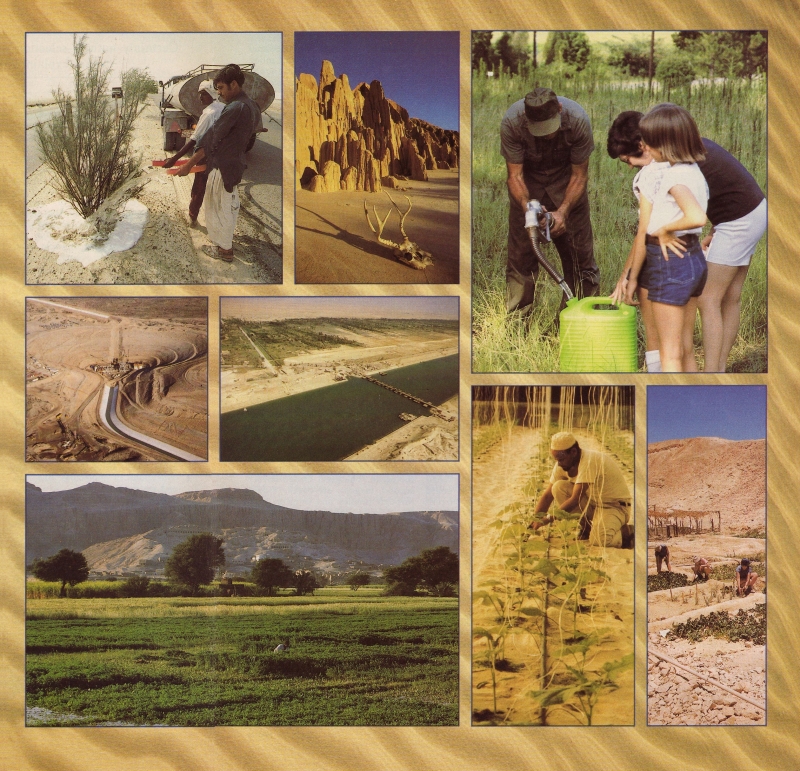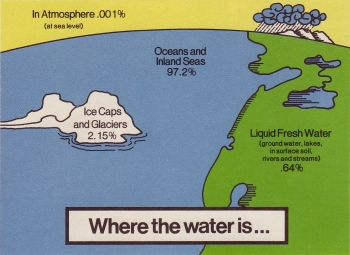The world's attention has been focused on petroleum supplies.
But another vital resource fresh Water has been taken for granted.
OIL? People got by without it for thousands of years. We could too if we had to. We could find alternate sources of energy. We could develop synthetic fuels. We could substitute and modify. We could live without it.
Not so for fresh water!
Life depends on it. Our bodies are composed mostly of water. We need fresh water to function — to drink, to bathe in, to grow food. There is no artificial water, no "synwater." It has to be the real thing.
But there is plenty of water on earth. Seventy-five percent of the surface of our planet is covered with it. Vast amounts are to be found underground. But the problem is that not all water is "fresh." And what clean, usable fresh water there is is becoming scarce to larger and larger segments of humanity.
|
Water is most appreciated where it is scarce.
In many areas of the world careful use is a way of life.

Beginning at upper left-hand corner and going clockwise, pictures show:
In Abu Dhabi, on the Arabian peninsula, the lack of rainfall means trees or decorative shrubs must be watered by hand. Rene Burg — Magnum
Dramatic portrait of stark desolation in Nevada. Daniel Dancer — Black Star
Rationing out available water during a drought. Keza — Liaison
Making the desert bloom in Israel. David Seymour — Magnum
In this agricultural project in Abu Dhabi, water is fed to plants through plastic tubing. Harry Redl — Black Star
A fertile, watered valley in mostly arid Egypt. Erich Lessing — Magnum
Partially completed pumping station in Arizona desert. Harry Redl — Black Star
And (center photo) a channel of water in Egypt. Rene Burg — Magnum
Background photo: Charles Moore — Black Star
|
The Giant Distillery
|
There is just about as much water on earth today as there ever has been. Very little has been lost or added since creation. The same water has been transferred time and time again from the oceans into the atmosphere, onto the land from where it has flowed back to sea, there to start the cycle over. It is as King Solomon perceived long ago: "All the rivers run into the sea; yet the sea is not full; unto the place from whence the rivers come, thither they return again" (Ecclesiastes 1:7).
This process — we call it the hydrological cycle — means that the oceans, the atmosphere and the sun all work together like a gigantic distillery. The heat of the sun on the oceans and other bodies of water causes water to evaporate into the air. The vapor-laden air eventually dumps its moisture in the form of rain or snow. Some falls back into the oceans, some falls on land. That which falls on land becomes springs, lakes, rivers and streams — fresh water suitable for man's use.
Under the crust of all of earth's continents are additional vast networks and bodies of water called aquifers — slowly flowing like underground rivers. This too is "fresh" water. It comes from surface water that soaks down through the earth, finally emptying into the seas.
|

Illistration by Minette Smith
|
Only recently has it been realized how extensive this system is. Some of the underground water extends as much as three miles below the surface. In the top half mile of the earth's crust alone there is more than 30 times the amount of fresh water than is contained in all the lakes, rivers, streams and inland seas on the surface put together.
All this sounds like a lot of water. But the fresh water available for human use is really only a drop in this vast bucket! About 97 percent of all water on earth is salty ocean water. Of what is left, slightly more than 2 percent is locked up as ice in polar regions. That leaves less than 1 percent fresh water on land and under it.
Still, the amount of fresh water constantly available could support several times the current world population. It could. But it is not even supplying the present-day needs of the human race. Why?
Population Distribution
Since the beginning, human societies have tended to locate and develop near river basins, lakes and other fresh water sources. During the course of time populations have increased out of proportion to available water. Political borders have sectioned off water supplies. Even weather patterns change. Population as a whole today is not distributed in the same way that fresh water is.
For example, 11 million people massed in 131 cities in the desert and semi-desert regions of Southern California depend heavily on water brought in from hundreds of miles distance by pipelines and aqueducts. The population has simply grown too large for the local water supply.
In crowded Hong Kong the situation is more complicated because international borders are involved. Here are not only too many people for available water, but the main supply originates in and is controlled by a neighboring nation, the People's Republic of China.
Worldwide, three fourths of the rural population and one fifth of the city dwellers do not have access to an adequate supply of water. Millions of women spend a good share of each day walking 10 miles or more from their homes just to obtain enough water for drinking and cooking. The World Health Organization has designed the 1980s as International Drinking Water Supply and Sanitation Decade. It hopes to bring about "safe drinking water and adequate sanitation by 1990 . . . for two billion people in the developing countries." The estimated cost will be some $30 billion a year.
By contrast to these areas, the mighty Amazon, largest river in the world, winds its way through sparsely inhabited tropical rainforests, dumping its incredible volume of nearly untapped water into the ocean. The great Congo River, second largest on earth, flows through jungles and empties into the Atlantic. Other major rivers such as the Mackenzie (Canada), the Yukon (Alaska) and the Ob and Yenisei (Soviet Union) run off into the frigid Arctic Ocean virtually unused. Lake Baikal, the largest and deepest single body of fresh water on earth, sits in relatively sparsely populated Asiatic Russia.
In those societies that have had an adequate supply of fresh water, the tendency has been not to appreciate it. Turn the tap on. Out comes the water. There has been water for bathing, washing the car, watering the lawn, operating industry, supporting agriculture and fulfilling thousands of other functions from filling water beds to carrying away sewage.
Outside of air for breathing, probably nothing has been more taken for granted by those who have it than water.
Not So Fresh
Today enormous quantities of industrial wastes are poured into lakes, rivers and streams, creating out of water, chemical soups. Thousands of injection wells have been dug where toxic wastes are pumped directly into the ground, thereupon polluting the aquifers. It has been estimated in scientific studies that half of the water in the ground is already contaminated either with disease-producing bacteria or industrial waste.
Not that industry should get all the blame. Other sources of pollution are detergents and drain cleaners from homes, salt used for melting ice, filth from city streets, insecticides and chemical fertilizers from agriculture, leaks from underground petroleum tanks, lead and cadmium dissolved from water pipes. And think of all the things water is used to clean and dilute.
A newly recognized problem is acid rain. This is rain that absorbs chemical pollutants in the air and becomes a toxic acid dropping down on land and — you guessed it — water supplies.
Add Drought
To these factors making good fresh water scarce, add one more disaster: drought! Drought is rain either not falling, or falling in the wrong place — over the oceans, for example, instead of over the land. This is producing a whole new set of complications. As ground water is being depleted in some areas, sea water is seeping in and mixing with the fresh water. Or the land is simply collapsing and sinking in.
Worldwide, three fourths of the available water supply is used for irrigation. Much of this water comes from underground reserves.
The vast Ogallala aquifer, the main water source for the American Great Plains (called the "breadbasket of the world") is now severely depleted. Likewise the water table under the agriculturally critical San Joaquin Valley in California has been so lowered that the land has settled 30 feet in some places. As the water level drops it is becoming very expensive to run electric pumps to draw water out. Yet if agricultural output declines substantially in these areas, significant effects, nationally and internationally, occur.
What is needed is rain in the right places. But that is going to be increasingly rare in the years just ahead for reasons most people have not expected!
When Rains Fail
You may not know it, but the period of time God has allowed for human beings to struggle with their problems in their own way is about to come to a close. Human history is a record of rebelling against God's government and His ways. The God who created nature and all the water there is, is going to punish humanity, as a parent punishes a disobedient child, till we learn our lesson.
One of the ways He punishes nations is to shut off the water supplies. Listen to this warning: "Take heed lest . . . the anger of the Lord be kindled against you, and he shut up the heavens, so that there be no rain, and the land yield no fruit, and you perish quickly . . .” (Deuteronomy 11:16-17, RSV).
To a rebellious and self-willed people, God declares: "The Lord shall send upon thee cursing, vexation, and rebuke . . . and thy heaven that is over thy head shall be brass, and the earth that is under thee shall be iron. The Lord shall make the rain of thy land powder and dust: from heaven shall it come down upon thee, until thou be destroyed" (Deuteronomy 28:20, 23-24).
If good water is scarce now in many areas, what will happen when God steps in and sends drought and dries up what moisture there is, till we come to our senses and at last submit to His ways that bring satisfaction, peace and prosperity.
Healing Waters!
When God sends Jesus Christ to set up His Kingdom over all nations, the world will have brought itself to chaos and ruin. But the policy of God's government will be to heal, rebuild and restore until the whole world is a paradise.
Think of it — no more shortages of water as nations learn to obey God. Rain will come when it should (Ezekiel 34:26) and in just the right amounts (Psalm 65:9-13). Where will be the need of complicated irrigation systems and huge dams with all of their drawbacks?
Vast deserts and desolate expanses will be inhabited as the results of divine rule over the earth.”I will open rivers on the bare heights, and fountains in the midst of the valleys; I will make the wilderness a pool of water, and the dry land springs of water," God promises (Isaiah 41:18, RSV).
The world's water problems — in fact, all its problems — will at last be solved!